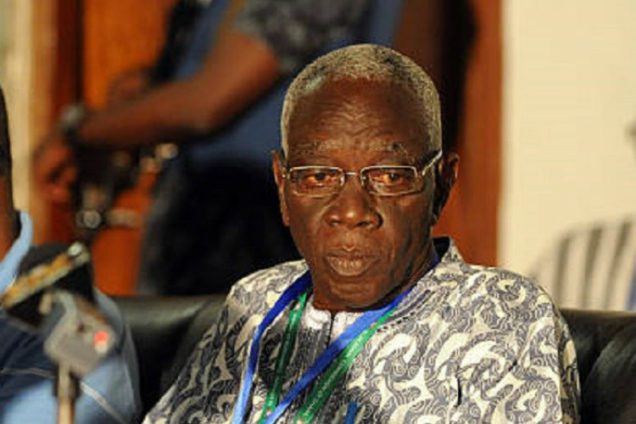Former Chairman of the Electoral Commission (EC) has recommended a second look at the appointments regime of various governments.
Dr Kwadwo Afari-Gyan says this will serve as a way to intensify accountability of the Executive arm of government.
The 78-year-old believes the worsening level of corruption and bad governance can be curtailed if this, among other modalities, is put in place.
Speaking at a Constitution Day Public Lecture in Accra, Dr Afari-Gyan explained that the provision where most of the appointments into Ministerial positions are given to legislators does not augur well for the country.
“I think that a system where ministers and their deputies are drawn from outside parliament will be better suited to holding the Executive in check,” he said on Monday, January 8, 2024.
For him, this makes it difficult to implement the principle of Separation of Powers, which is a key factor in ensuring a formidable democracy.
“With about half ministers plus some of the deputy ministers drawn from parliament, the legislator can not effectively check the Executive. Cabinet decisions are bidding on ministers and deputy ministers and they must be defended by them including in parliament," he explained.
Dr Afari-Gyan suggested that the requirement to appoint many ministers from Parliament only benefited the President since it would be easy for him to have some policy approved without any hindrances.
“Indeed the requirement to appoint so many ministers from Parliament may be an incentive for a president to increase the number of ministers in order to minimise potential trouble with parliament.
Beyond this, Dr Kwadwo Afari-Gyan also recommended other specific areas of the 1992 Constitution that should be considered for amendments.
On the Council of State, Dr Afari- Gyan said despite the advisory body’s revered role, the work it has undertaken so far does not align with its intended role but creates the impression that it was an “honorific institution without power.”
He said however that apart from the President, the Council has the power to advise every public institution.
“It will help the public to gauge the Council’s impact if periodically, it issues a report indicating what advice it has given to which institution,” he said.
Touching on local government, he stated that nothing can be achieved without fundamental reforms in the local government system.
Referencing the failure of the local government, he said calls by citizens for the government to provide toilet facilities dramatises the shortcomings at the local level.
He emphasised, “Clearly, what we have now is the shadow and not the substance of decentralisation.”
However, he said all was not lost.
The former head of the Electoral Commission said powers and resources must be allotted to the unit committees to enable them make decisions on their own.
He further said the District, Municipal and Metropolitan Chief Executives must be elected to promote their accountability to the local people.
Latest Stories
-
Reality zone with Vicky Wireko: Painting Ghana purple: Be aware, May is month of mental health awareness
3 mins -
Prof Opoku-Agyemang’s integrity is admirable – Inusah Fuseini
16 mins -
Your reign has been a beacon of wisdom – Alan Kyerematen tells Asantehene
17 mins -
Akufo-Addo’s driver wins La Dadekotopon NPP primary
19 mins -
Education Minister must channel resources to rebrand basic public schools into tackling critical needs – Minority
22 mins -
CAFCC: “Dreams need to score early to unsettle Zamalek” – Former Zamalek striker Felix Aboagye
2 hours -
GHS launches mobile app to counter misinformation about vaccines
2 hours -
Election 2024: Care Ghana warns EC of recruiting political actors as Returning Officers
2 hours -
Mohammed Kudus gets 5th Premier League assist as West Ham hold Liverpool
2 hours -
Religious support source of my success – Asantehene
2 hours -
Sierra Leone energy minister resigns over electricity crisis, as power returns to capital
2 hours -
EC accuses Bright Simons, IMANI Africa of peddling falsehood
3 hours -
GRA/SML contract: Akufo-Addo has whitewashed the KPMG report – Inusah Fuseini
3 hours -
USM Alger receive warm welcome at Oujda Airport ahead of game against RS Berkane
4 hours -
2023/24 Ghana Hockey League to kick-off this weekend
4 hours

